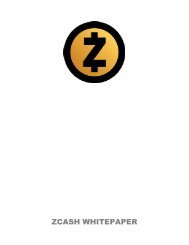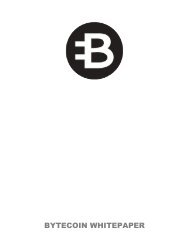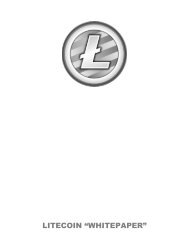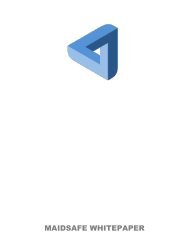Whitepaper - Ethereum Classic With Cover
Create successful ePaper yourself
Turn your PDF publications into a flip-book with our unique Google optimized e-Paper software.
<strong>Ethereum</strong> <strong>Classic</strong> Documentation, Release 0.1<br />
specific project for distributed file storage. IPFS is an non-<strong>Ethereum</strong> project which has close ties to <strong>Ethereum</strong>; it<br />
will be used independently and may be used as an added layer underlying Swarm in the future. See this <strong>Ethereum</strong><br />
StackExchange post on the topic for more information.<br />
Is <strong>Ethereum</strong> based on Bitcoin?<br />
Only in the sense that it uses a blockchain, which Bitcoin pioneered. <strong>Ethereum</strong> has a separate blockchain that has<br />
several significant technical differences from Bitcoin’s blockchain. See this <strong>Ethereum</strong> StackExchange answer for<br />
a detailed explanation.<br />
What’s the future of <strong>Ethereum</strong>?<br />
<strong>Ethereum</strong> developers are planning a switch from a Proof-of-Work consensus model to a Proof-of-Stake consensus<br />
model in the future. They are also investigating scalability solutions and how to store secrets on the blockchain.<br />
What’s the difference between account and “wallet contract”?<br />
An account is your public / private key pair file that serves as your identity on the blockchain. See “account” in<br />
the glossary. A “wallet contract” is an <strong>Ethereum</strong> contract that secures your ether and identity with features such<br />
as multisignature signing and programmed deposit/withdrawal limits. A wallet contract can be easily created in<br />
the Mist <strong>Ethereum</strong> Wallet GUI client.<br />
Are keyfiles only accessible from the computer you downloaded the client on?<br />
No, you are welcome to export or move the keyfile, but always remember to backup your keyfiles and be aware of<br />
which computers you store your keyfile on.<br />
How long should it take to download the blockchain?<br />
The <strong>Ethereum</strong> blockchain is constantly growing, and is nearing 10GB as of March 2016. The amount of time it<br />
will take to download depends on the amount of peers you are able to connect to, your internet connection speed,<br />
and other factors. See the :ref: download-the-blockchain-faster section for tips on syncing the blockchain more<br />
quickly.<br />
How do I get a list of transactions into/out of an address?<br />
You would have to pull the transactions manually out of the blockchain to achieve this. Alternatively, you can rely<br />
on third party explorers’ API’s like Etherchain. For contract execution transactions however, you can filter the<br />
contract logs to achieve this.<br />
Can a contract pay for its execution?<br />
No this is not possible. The gas for the execution must be provided by the address submitting the execution<br />
request.<br />
Can a contract call another contract?<br />
Yes, this is possible, read about interactions between contracts.<br />
Can a transaction be signed offline and then submitted on another online device?<br />
Yes, you can refer to the solution from Icebox.<br />
1.8. Frequently Asked Questions 113
















